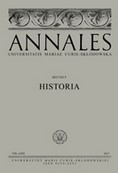Spytek z Melsztyna – legalista czy „głoszący nowinki” przeciwnik działań podejmowanych dla dobra państwa? Wokół zjazdu elekcyjno-koronacyjnego po śmierci Władysława Jagiełły w Krakowie w lipcu 1434 roku
Spytek from Melsztyn – a Legalist or “Proclaimer of News” Opponent of Actions Undertaken for the Good of the State? Around the Election and Coronation Convention after the Death of Władysław Jagiełło in Kraków in July 1434
Author(s): Wioletta ZawitkowskaSubject(s): Local History / Microhistory, Political history, Government/Political systems, Electoral systems, 15th Century
Published by: Wydawnictwo Naukowe Uniwersytetu Marii Curie-Sklodowskiej
Keywords: Spytek from Melsztyn; Władysław Jagiełło; Władysław III; elections and coronation convention in Kraków;
Summary/Abstract: Spytek from Melsztyn was the only son of the Kraków voivode who died tragically at Worskla. Both he and his relatives probably hoped that he would play a significant role in the ruling elite of the time. After the death of Władysław Jagiełło, in the course of the discussion at the congress in Opatów in 1434, which can probably be treated as a congress of the gents of Lesser Poland – in analogy to the congress of gents of Greater Poland, which Oleśnicki summoned to Poznań – Spytek grew up to be the leader of oppositionists, the leader of “proclaimers of news”. He also played such a role at the elections and coronation congress in Kraków in the last decade of July 1434. Next to him, other leaders, mainly unnamed “proclaimers”, were in the lead. Spytek from Melsztyn and his supporters, however, did not manage to attract larger groups to their side. On the other hand, the Bishop of Oleśnica and Queen Sophia managed to lead to the election and coronation of Władysław III after long debates. They both realized that due to Jagiellon’s young age, the decisions would be made anyway by the royal council, and more precisely by a group of magnates residing in Kraków – in this arrangement, the Bishop of Oleśnica, due to his permanent residence in the capital, probably hoped to achieve the position of the leader. Therefore, it is possible that precisely in order to calm the voices of opposition raised, among others, by Spytek, it was decided to appoint puppet supervisors, tutors, an institution so far unknown in Polish law. Spytek did not receive any office then, so his efforts were a complete failure. In the light of the events of 1434 discussed above, it can be concluded, that the assessment of his character cannot be unequivocal. He was certainly a legalist, but too strict, blindly demanding to follow the established rules, refusing to modify them in accordance with the plans of most decision-makers of the political scene at the time. However, presenting him as a “proclaimer of news”, or even more so as a troublemaker of public order, does not seem fully adequate to the events of those days. Demanding literal respect for the established law and presenting his demands sometimes quite firmly, he was simply unable to adjust to the decisions made by the majority of the council gents.
Journal: Annales Universitatis Mariae Curie-Skłodowska, sectio F – Historia
- Issue Year: 75/2020
- Issue No: 1
- Page Range: 211-229
- Page Count: 19
- Language: Polish

